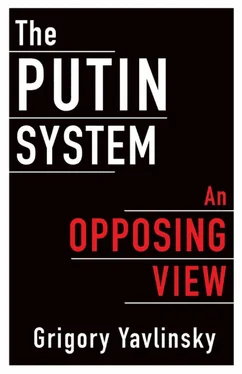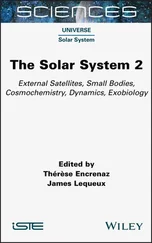These alternative systems include various types of autocracies, including theocracies and semifeudal systems of rule based on direct personal service of local power holders to more powerful authorities and on outright violence by warlords or field commanders. They also include totalitarian regimes built upon the theories of ethnic or ideological superiority, as well as all kinds of mixed and transitional systems. It is worth noting that the time horizon of their existence is no longer estimated to be just a few, or ten, or fifteen years at best; instead, it is expected that they may be able to exist and go through changes over extended periods of time while possibly enjoying high degrees of stability.
I believe that this relatively new approach to the potential prospects of existing autocracies is much closer to reality than the prior notion of their predetermined internal exhaustion, their lack of capacity to adapt to existing realities and their looming collapse. Moreover, the direction of changes within these systems is not an a priori given; it may vary greatly depending on circumstances. In some instances, these changes may result in the consolidation and even improved effectiveness of the monopolistic exercise of power by the ruling group. Of course, as the society under their rule and the tasks they face become more complex, the advantages of a competition-based political system over its authoritarian counterpart become increasingly more tangible—both from the point of view of efficient resource utilization and in terms of lowering the risks of major blunders and ultimately of a potential collapse of statehood as such.
Nonetheless, it must be noted that several factors present in the world today increase the possibility of a protracted survival of authoritarian political systems, even though these systems are out of sync with their surroundings. The first of these factors is the long-term division of the world into the “center” and the “periphery,” with the periphery facing objectively lower demands than does the center in terms of the efficiency of governance and of its success in accomplishing its socioeconomic tasks. To put it simply, to serve as a supplier of certain kinds of raw materials to the developed world, a peripheral country is by no means required to build a modern, socially responsible system of governance that would ensure progress in science and technology or to strike a balance among various social, territorial, and ethnocultural groups, let alone to undertake an effective pursuit of economic, technological, or political leadership in the world. To serve as a raw materials provider, it is quite sufficient to have the minimally required material infrastructure and to protect it against destructive forces, which is a manageable task for even the most archaic authoritarian systems. Dozens of countries have managed to fit into the world economy in one way or another, even if only as a remote and isolated outskirt, without having a functionally proficient modern state or even planning to develop one in the foreseeable future.
Another factor consists of the objective changes in the economic underpinnings of contemporary developed societies, which have been reducing the significance of control over territories as a source of the country’s well-being. Merely two hundred years ago, a decline in the power and effectiveness of a given state would almost inevitably bring with it the loss of control over territories, to the advantage of its more powerful neighbors, leading to a change in the composition of the ruling circle, if not of the entire system. Today, in contrast, weak and ineffective states may exist for a long time without being viewed by stronger powers as a potentially desirable acquisition that they would like to incorporate or to control. The prosperity of the developed world is increasingly based on sources that have nothing to do with controlling territories of others. In my previous book, Realeconomik , I wrote quite a bit about rent derived from one’s historical advantage (historical rent) and rent on intellectual capital (innovation rent), which serve as the sources of large-scale revenues for developed countries without their having to maintain control over foreign territories. [2] Grigory Yavlinsky, Realeconomik: The Hidden Cause of the Great Recession (and How to Avert the Next One) (New Haven, Conn.: Yale University Press, 2011).
It is easy for developed countries to gain access, through international trade and investment, to raw mineral or energy resources that are physically located in specific territories. Under these circumstances, even the so-called “failed states” can linger for decades without being physically taken over by anyone willing to take advantage of their infirmity.
Finally, the third factor that would seem to increase the possibility of the protracted survival of authoritarian political systems is a general softening of the developed part of the world, sometimes called its weakness, its spinelessness, the extinction of its spirit, and so on. This is a condition of society in which everyday life and the relative well-being of most of one’s fellow citizens (who are also voters and whose sentiments have to be taken into account in politics) are becoming more valuable than the vision of a global transformation, of bringing other parts of the world in line with one’s own views about the desirable organization of society, and other similar collective and supranational goals. This helps to explain why countries that view themselves as the political leaders of the Western world, with a mission to “spread democracy” everywhere, are actually unwilling to expend any substantial amount of financial or other resources toward this purpose. These countries widely tout their support for the “struggle for freedom,” and yet, even with regard to autocracies whose prospects for an institutional transformation seem to be quite realistic, their support is typically limited to rhetorical stunts, along with very modest financial contributions to those whom they identify as the opposition to authoritarian rule and as “friends of the West.” And when some of these Western countries resort to costly military campaigns to advance these goals, as the United States did in the Iraq campaign, for instance, they typically do it in response to specific situations and to domestic political needs, which does not have much to do with any strategy of promoting democracy. Moreover, the new regimes to emerge after such campaigns are rarely a significant improvement over their predecessors.
Therefore, if present-day authoritarian regimes ever lose their grip on society, it usually is caused not by some external impact or by a lack of international competitiveness; rather, it typically comes about for internal reasons. Foremost among these internal causes is the regime’s inability to ensure that the economic, political, and social developments within its jurisdiction remain controllable. And this failure, in turn, may occur simply because several things go wrong at the same time or, more often, because mistakes or erratic decisions are made by the ruling circle or the autocratic leader. Absent the mechanisms for the system to auto-correct these errors, the regime is led into a dead end, where it is incapable of meeting the challenges it faces.
Nevertheless, there are certain patterns in the evolution of political systems, and this must also be applicable to the peripheral authoritarian system that has taken shape in today’s post-Soviet Russia. Despite all the caveats and uncertainties mentioned earlier, some of the changes within the system are more probable than others, and the direction of these changes is determined both by the system’s internal logic and by its environment. Since both of these variables are fairly predictable, we can also forecast and describe the most probable scenarios for prospective developments in Russia.
Читать дальше












